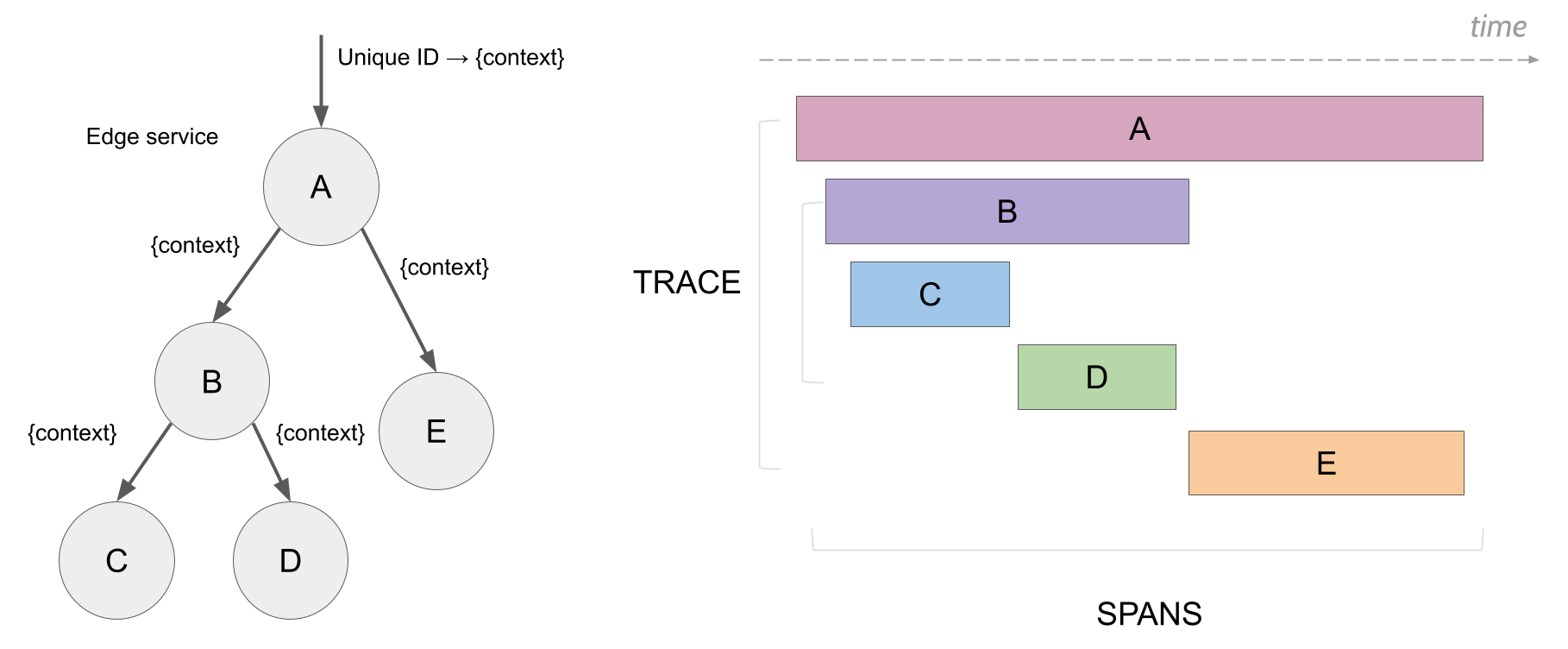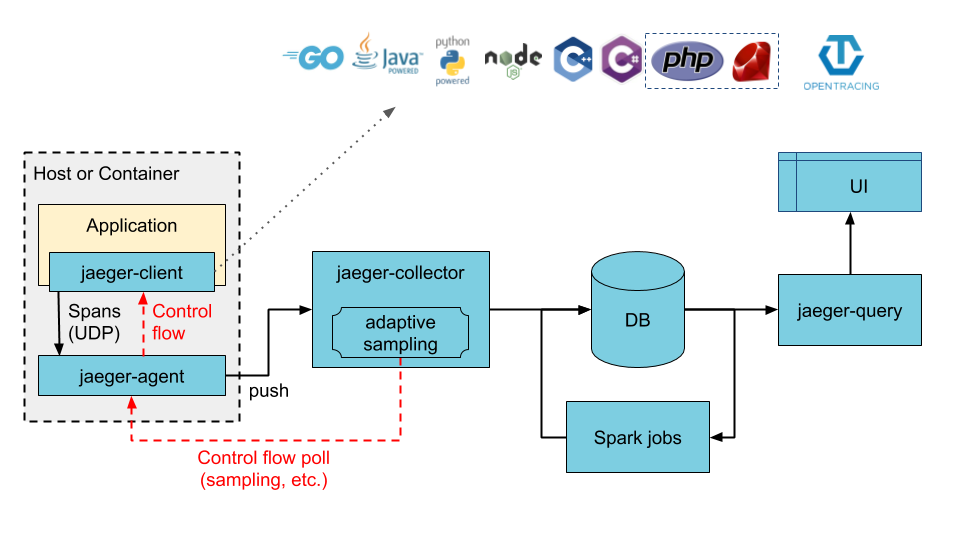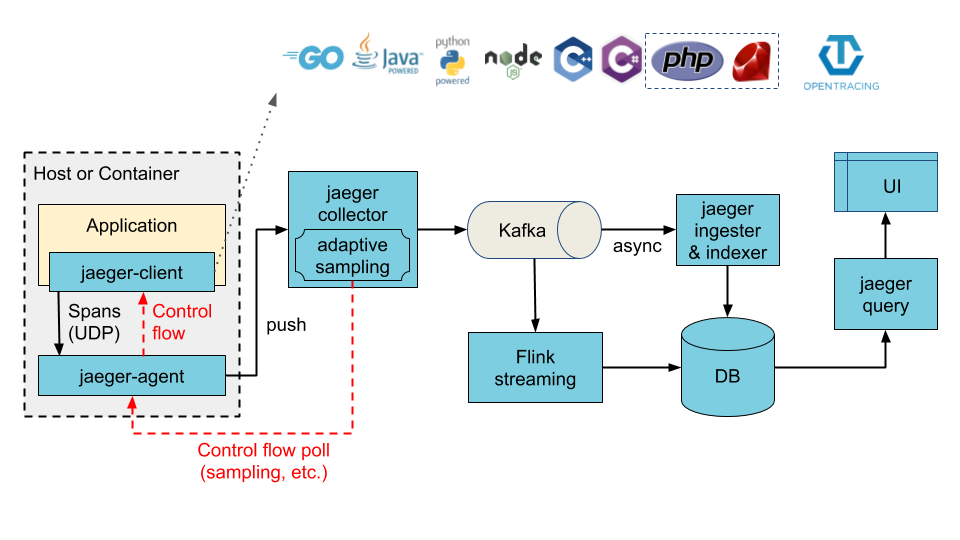@chankamlam/express-jaeger v1.1.29
Express-Jaeger
_
_____ ___ __ _ __ ___ ___ ___ (_) __ _ ___ __ _ ___ _ __
/ _ \ \/ / '_ \| '__/ _ \/ __/ __|_____| |/ _` |/ _ \/ _` |/ _ \ '__|
| __/> <| |_) | | | __/\__ \__ \_____| | (_| | __/ (_| | __/ |
\___/_/\_\ .__/|_| \___||___/___/ _/ |\__,_|\___|\__, |\___|_|
|_| |__/ |___/ Jaeger middleware to request tracing for express application
Required Reading
Opentracing
To fully understand Opentracing, it's helpful to be familiar with the OpenTracing project and terminology more specifically.
Jaeger(One Of Request Tracing System implement Opentracing)
To fully understand Jaeger, it's helpful to be familiar with the Jaeger project and Jaeger Client for Node
Simple Concept

One request map to one trace
One trace atleast has one span which is master span
Master span can have many children spans
Installation
npm i @chankamlam/express-jaeger -SArchitecture of Jaeger Server
for development
for prodution
Build up Jaeger Server Infra locally(development env)
docker run -d -e COLLECTOR_ZIPKIN_HTTP_PORT=9411 -p5775:5775/udp -p6831:6831/udp -p6832:6832/udp \
-p5778:5778 -p16686:16686 -p14268:14268 -p9411:9411 jaegertracing/all-in-one:latestQuick Start
const express = require("express");
const jaeger = require("@chankamlam/express-jaeger");
const app = express();
const config = {
serviceName: 'service1-express',
sampler: {
type: "const",
param: 1
},
reporter: {
collectorEndpoint: "http://localhost:14268/api/traces"
},
}; // required
const options = {
baggagePrefix: "-Johua-", // optional,you can let options={}
excludePath:["/api/v1/health","/api/v1/metric"] // exclude path
};
app.use(express.json()) // for parsing application/json
app.use(express.urlencoded({ extended: true })) // for parsing application/
x-www-form-urlencoded
app.use(jaeger(config,options,(req,res)=>{
// here to write your code
// which is showing here is to auto record query/body/path for every request
const jaeger = req.jaeger
jaeger.setTag("route",req.path)
jaeger.setTag("body",req.body)
jaeger.setTag("query",req.query)
}));
app.all("/abc", async function (req, res) {
res.send({code: 200, msg: result});
});
app.listen(3000, '127.0.0.1', function () {
console.log('start');
});Usage
normallyUsingSpan2Log
const express = require("express");
const jaeger = require("@chankamlam/express-jaeger")
const app = express();
// setup config, atleast need this param
const config = {
serviceName: 'aservice-express', // your service name
sampler: { // setup sampler
type: "const",
param: 1
},
reporter: {
collectorEndpoint: "http://localhost:14268/api/traces" // your jaeger server endpoint
},
};
// setup options, defaut is {}
const options = {
baggagePrefix: "-Johua-",
excludePath:["/api/v1/health","/api/v1/metric"] // exclude path
};
/*
* using jager,after this it will has one object which called jaeger,
* with four properties(span,tracer,request,tags) binding in req
*/
app.use(jaeger(config,options));
app.get("/normallyUsingSpan2Log", async function (req, res) {
const jaeger = req.jaeger;
jaeger.log("timestamp",Date.now());
res.send({code: 200, msg: "success"});
});
app.listen(3000, '127.0.0.1', function () {
console.log('start server...');
});usingSpan2LogWithError
app.get("/errorUsingSpan2Log", async function (req, res) {
const jaeger = req.jaeger;
const tags = req.jaeger.tags;
try {
throw Error("err"); // create exception to test
} catch (err) {
jaeger.setTag(tags.ERROR, true); // diaplay to JaegerUI when you mark tag as "error"
jaeger.log("errorMsg", err.message);
}
res.send({code: 200, msg: "success"});
});remoteCallingAndlogResult
app.get("/remoteCallingAndlogResult", async function (req, res) {
const jaeger = req.jaeger
// for remote request, you have to use jaeger.axios which wrap axios by tracing
const result = await jaeger
.axios({url:"http://localhost:3001/bc"})
.then(r=>r.data);
jaeger.log("result",result)
res.send({code: 200, msg: "success"});
});remoteCallingAndlogResultInTwoSpan
app.get("/remoteCallingAndlogResultInTwoSpan", async function (req, res) {
const jaeger = req.jaeger
// default under master span (auto create by every request)
const span1 = jaeger.createSpan("resut1")
const result1 = await jaeger
.axios({url:"http://localhost:3001/a"})
.then(r=>r.data);
span1.log("result1",result1)
span1.finish();
// default under master span (auto create by every request)
const span2 = jaeger.createSpan("resut2")
const result2 = await jaeger
.axios({url:"http://localhost:3001/b",method:"post",data:{}})
.then(r=>r.data);
span2.log("result2",result2)
span2.finish();
jaeger.log("resultOfMasterSpan","here is master span")
res.send({code: 200, msg: "success"});
});Lookup Request Tracing
open url http://localhost:16686 , remember to build up the Jager Server locally first


Object Detail
Config
for detail, pls look up to Jaeger Client for Node
{ serviceName: "string", // required disable: "boolean", sampler: { type: "string", // required param: "number", // required hostPort: "string", host: "string", port: "number", refreshIntervalMs: "number" }, reporter: { logSpans: "boolean", agentHost: "string", agentPort: "number", collectorEndpoint: "string", // required username: "string", password: "string", flushIntervalMs: "number" }, throttler: { host: "string", port: "number", refreshIntervalMs: "number" } }
options
for detail, pls look up to Jaeger Client for Node
{ contextKey: "string", baggagePrefix: "string", metrics: "object", // a metrics logger: "object", // a logger tags: "object", // set of key-value pairs which will be set as process-level tags on the Tracer itself. traceId128bit: "boolean", shareRpcSpan: "boolean", debugThrottler: "boolean", excludePath:"array" // array of parttern for excluding record the access }
jaeger
jaeger object will bind in req when you do "app.use(jaeger(config,options))"
{ log : function(name,content) // write the log to master span setTag : function(name,value) // setup tag to master span setTracingTag : function(name,value) // setup tag to master span and children span addTags : function({k1:v1,k2:v2}) // setup mutiple tags to master span createSpan : function(name) // create a new span un der master span tags : object // all defined tags of opentracing which can be used axios : function(url,options) // using it to remote call service if not it will be broken the tracing to next service }log
req.jaeger.log("info","..........")setTag
const jaeger = req.jaeger const tags = jaeger // using defined tags by opentracing jaeger.setTag(tags.ERROR,true) // using your customize tag jaeger.setTag("warning",true)
### _setTracingTag_const jaeger = req.jaeger const tags = jaeger jaeger.setTracingTag("waybill","wb-123456")
### _addTags_const jaeger = req.jaeger const tags = jaeger // add mutiple tag one time jaeger.addTags({"error":true,"info":true})
### _createSpan_const span = jaeger.createSpan("subSpanName") // create a sub span under master span // you also can call method of span span.log("info","info......") span.setTag("info",true) // remember to call finish() if not there is no record send to jaeger span.finish();
### _tags_
predefined tag, some come from [OpenTracing project](http://opentracing.io)
### _axios_
jaeger.axios wrap axios with tracing header, for usage detail pls look up to [axios](https://www.npmjs.com/package/axios)
## license
MIT5 years ago
5 years ago
5 years ago
5 years ago
5 years ago
5 years ago
5 years ago
5 years ago
5 years ago
5 years ago
5 years ago
5 years ago
5 years ago
5 years ago
5 years ago
5 years ago
5 years ago
5 years ago
5 years ago
5 years ago
5 years ago
6 years ago
6 years ago
6 years ago
6 years ago
6 years ago
6 years ago
6 years ago
6 years ago
6 years ago
6 years ago
6 years ago
6 years ago
6 years ago
6 years ago
6 years ago
6 years ago
6 years ago
6 years ago
6 years ago
6 years ago
6 years ago
6 years ago
6 years ago
6 years ago
6 years ago
6 years ago
6 years ago
6 years ago
6 years ago
6 years ago
6 years ago
6 years ago
6 years ago
6 years ago
6 years ago
6 years ago
6 years ago
6 years ago

